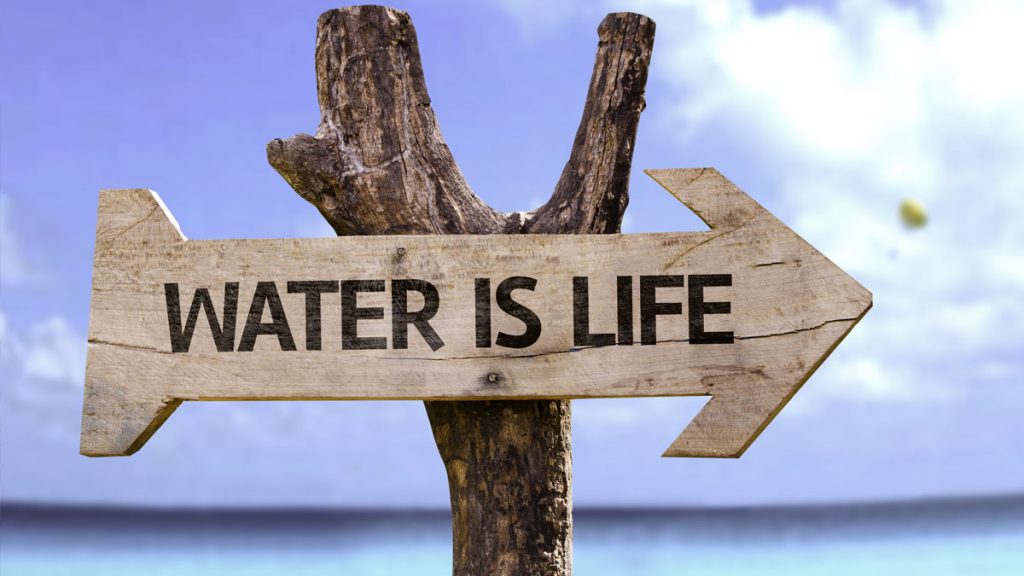
In the Jewish tradition, our relationship to water cannot be understood without also exploring our relationship to Gd. The two are interwoven in a bond that transcends humanity. Written in our holy texts, water existed even before creation. Before life existed on earth, Gd offered this primordial gift of sustenance to all that would one day live.
These primordial seeds of divinity exist, still, in our living relationships with the Vastness and the Eternal when we sit before the vast ocean and encounter water and the depths and world beneath its surface; the refreshment that comes with a summer rainstorm; and the awe and power of standing before a waterfall as it crashes onto stones and folds in on itself. In the presence of water, we are forced to face the vulnerability of our smallness. And, in a moment of acute thirst, the revitalization, relief, and replenishment that comes with that first sip. Water is sustenance. It is the universal requirement for human life. It is the way that Gd manifests on earth and provides life to living things. Water is life.
If water is divine, what does it mean that we have created a world in which it is commodified? Something inherently sacred and acknowledged in scripture as a universal human right has, for many years, been owned and sold.
As I reflect on the powerful cries for social justice which have been amplified in the wake of the killings of George Floyd, Breonna Taylor, Rayshard Brooks, and so many others, I reflect on the system of inequity that serves as the foundation for our country. The United States is built upon systems that are broken. These systems shatter the lives of the underprivileged, disproportionately impacting the lives of Black and Brown communities. These systems restrict access to basic, eternal human rights marked, in part, by a disparity in access to clean, safe, and affordable drinking water, particularly in under-resourced communities.
If water is life, what does it say about our society when some have access to it and others do not?
As water is life, water is Torah, a sacred gift that teaches us how to be present in our world, a blueprint for spiritual living on this planet. As we look into it, we see a reflection of ourselves—who we are and who we might be. Water teaches us of the fluid, changing nature of the world—sometimes rushing and sometimes slow. Each of us is a single drop in the wholeness and the holiness of something much greater than ourselves. Together, the drops create something with the potential to sustain, refresh, and revitalize, or to damage, flood, and erode.
At the root of our broken systems is a spiritual lack—a lack of awareness of the interconnectedness of all things. A lack of acknowledgement that we are all pulled along by a shared current and that, as the Torah tells us, we are all implicated while in the existence of an oppressive system—there is no such thing as an innocent bystander. Justice will only be achieved when what is needed for people to live, survive, and to thrive, is accessible to all people.
So, in this moment when water has been co-opted as a tool of disenfranchisement, let us look toward water instead as a model for power, sustenance, and universality. Perhaps, in its sacred presence, we will be empowered to transform our daily, mundane ways into holy acts. Perhaps, inspired by the sacred, we will have the courage to turn toward our responsibility to acknowledge the privilege we have and to leverage it in support of those who do not have what they need. Perhaps, through water, we can preserve our connection to Gd’s sustaining power in order to transform lives and to end the brutality of our world.
 Mikey Hess-Webber is a rabbinic educator at Towson Hillel, and a member of the 2020 ICJS Justice Leaders Fellowship.
Mikey Hess-Webber is a rabbinic educator at Towson Hillel, and a member of the 2020 ICJS Justice Leaders Fellowship.
Baltimore is part of a national conversation around questions of justice, race, and community. Members of the ICJS Justice Leaders Fellowship consider how Jewish, Christian, and Muslim teachings and practice can contribute to the public conversation about (in)justice. Opinions expressed in this blog are solely the author’s. ICJS welcomes a diversity of opinions and perspectives. We do not seek a single definition of justice between or within traditions.